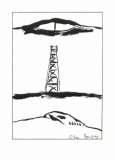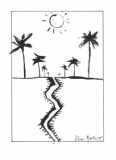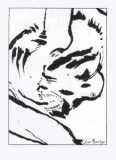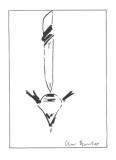Clive on The Great And Secret Show
Buddy neither believed nor disbelieved his eyes: he simply stood before the experience as before feminine beauty, mesemerised. Only when the third round of laughter began did he grasp its direction, and start off at a run towards it, the light still vacillating.
A few yards on he saw a movement ahead of him through the trees. Bare skin. A girl stripping off her underwear. Beyond her was another girl, this one blonde, and strikingly attractive, beginning to do the same. He knew instinctively they weren't quite real, but he still advanced cautiously, for fear of startling them. Could illusions be startled? He didn't want to risk it; not with such pretty sights to see. The blonde girl was the last one undressed. There were three others, he counted, already wading out into a lake that flickered on the rim of solidity. Its ripples threw light up on to the blonde's face - Arleen, they named her as they shouted back to the shore. Advancing from tree to tree, he got within ten feet of the lake's edge. Arleen was in up to her thighs now. Though she bent to cup water in her hands and splash it on her body it was virtually invisible. The girls who were deeper in than she, and swimming, seemed to be floating in mid-air.
Ghosts, he half thought; these are ghosts. I'm spying on the past, being re-run in front of me. The thought propelled him from hiding. If his assumption was correct then they might vanish at any moment and he wanted to drink their glory down in gulps before they did.
"Succinctly put, it's about Hollywood, sex and Armageddon. I wanted to do for America with 'The Art' what I hope I accomplished by setting 'Weaveworld' in England."
Hollywood, Sex and Armageddon
By [ ], Publishing News, 12 May 1989
"The locale has moved
West [from the Catskill Mountains]. The story's now
set in California. I now prefer to describe it as about
sex, the movies and Armageddon in Hollywood. But, yes,
it's still about good v. evil in America. I discovered,
during the last nine months in L.A and its environs,
that there were some things about that environment which
were appropriate to the novel. The West Coast is a
relatively new experience for me, but in the last few
months I've had a concentration of experiences there.
"The Art took four months to research and, even if I was busy at the
studios during the day, I would make the time in the evenings. One of
the nice aspects about writing a book about the movies is that I'm
actively involved in the type of situations I'm writing about."
If You Knew Clive Like We Know Clive
By Philip Nutman, Fangoria, No 78, October 1988

"I will have hopefully at that point [January 1989] delivered 'The Art' which is a big fantasy set in Hollywood about sex, Armageddon, and the movies, which will be of a size with 'Weaveworld'.....'The Art' will come out in America and Britain Autumn of '89... It's set in Ventura county, California, just a little way outside Los Angeles. It's a large-scale, ambitious fantasy about good and evil in America which is shaping up well, and I'm looking to do a book which will do for the American scene what 'Weaveworld' did for the British. In the sense that 'Weaveworld' was about certain uniquely British attitudes; and social circumstances which, if not uniquely British, were part of the British texture. I want to do for a particularly attractive part of America - California - something similar. I have a love / hate relationship with California. I don't like it that much until I've gone from it. Then I wish I was back there. I'm writing as an outsider looking in, which is a particular angle I think's going to be of interest. It will have the same mixture of the fantastical and the strange and the sexual and the weird and the magical and the visceral as 'Weaveworld'. The kind of fiction which is in a lot of categories and so probably is in no category except imaginative fiction. I want people to buy a Clive Barker book and say, 'Well, what's Barker cooked up for us this time?' And that becomes a more interesting challenge in a way than trying to write it for a particular slot."
Chains of Love
By Mark Salisbury Fear, No 3, December 1988

"The idea of The Great and Secret Show isn't that this be simply frightening. What happens is that two warring forces - one force for great good, one force for great evil - have fought themselves to an impasse; they can fight no further so they have to fight through things that come out of us - our dreams."
Good Morning America
By Charlie Gibson, Good Morning America, 25 January 1990
"It's a huge book - 720 pages - set in America. Hollywood, sex and Armageddon. It's not a horror book, more a dark fantasy book, and it has gone into the best-seller lists tomorrow, a week after publication.
"The sexual stuff has always been very strong in my books and this is no exception. There are scenes of profound weirdness that shouldn't be talked about over a civilised dinner table.
"I found this little town in Ventura County just outside Los Angeles and re-named it for the book. The residents' obsessions and dreams erupt into the real world."
The Fantasy Man Has No Illusions
By John Gibson, Evening News, Edinburgh, 26 August 1989
"Sometimes an image comes along which is so perfect you absolutely have to have it: who could possibly improve on the symbolic significance of a perfect little town - the lawns all evenly mowed, everything working like clockwork - constructed on a fault line?"
Clive Barker's Aim: A Mixture Of Horror And Fantasy
By Francesca Coltrera, The Boston Herald, 11 February 1990

"It's about our dream lives. An incalculable evil is moving out of another dimension to invade our reality. The book's about movies, pornography and love. It's my first big book about America. The Iad Uroboros have one ambition: to destroy our universe. They are big, dark and pissed off. The bulk of the book - I would say 90% - takes place in the real world. Only 10% takes place in Quiddity. But you know what my reality is like. My reality is open every minute to transformations, to transfigurations - a ghost haunted, vision haunted world in which magic and demonic doings can erupt at the slightest invitation... What preoccupies me in The Art is the idea of the dream show, what happens to us in the 25 years of our lives when we sleep. Our psychologies are so complex. We are telling stories to ourselves all the time. In the Great And Secret Show, the story is one which turns out to have a relevance beyond the realm of sleep. In other words, what we discover in the first book (albeit briefly, because there's a huge story yet to be told) is that sleep is a door, that dreams are more than casual fictions we whip up for our own delectation. Dreams are part of a matrix of mythologies where we are given clues for our survival and that intrigues me immensely. It's one of the reasons I love this kind of fiction. I value it because it's a manual for survival."
Clive Barker - Lord Of The Breed
By Philip Nutman, Fangoria, No 91, April 1990 {Note : interview took place in June 1989}
"Hopefully, readers will find some parts funny, some parts erotic and others chilling. It was a very tough book to write because of the scale of the ambition."
Brit Clive Barker Masters Horror In Movies, Books
By Gene Mierzejewski, Chicago Sun-Times, 1 March 1990
"Books like mine - phantastique books of various kinds - are maps, ways to find your way around that adventure, the adventure which takes a third of your life up, and probably a lot more, because even in our conscious lives we're living in fantasies of ambition, we're living in fantasies of desire, we're living in fantasies of what might happen to us if we turn this corner as opposed to that corner.
"Our lives are forever segueing into the fantastical, into the daydream, into the dreamed ambition, the dreamed encounter. And I think if you would actually add up the amount of time that we spent of our lives living a kind of fiction - whether it be through a movie or through a day-dream or through a night-dream, sexual fantasy, whatever else it is - it'd be a lot of time. And I think that fantasy fiction is describing that universal adventure. In fact, The Art is about the universal adventure."
Clive Barker: Sex, Death and Censorship
By W.C. Stroby, Asbury Park Press, 20 December 1989
"[The Great and Secret Show] has some dark and secret parts, but the best journeys do...
"It's a title I love because it implies exactly what the book is about. That is something that clearly my fans and,
indeed, I as a reader enjoy, and that is being taken on a flight, being taken on a journey.
"I have a very clear idea of where I want to take these characters and the mythology that underpins them. I knew I
couldn't investigate (every aspect) without making the book twice the length that it was.
"I don't know even now if it is (part of) a trilogy. It could be a quartet. I knew there was a lot more to tell."
Clive Barker: Hell-Raising Author Has Two New Projects
By Dan Pearson, Sunday [supplement], 18 February 1990
"On The Great and Secret Show, 'The New York Times Review of Books' said, 'If you don't like the new Thomas Pynchon try the new Clive Barker,' which was one of the nicest things anybody's ever said... "Going back to that 'New York Times' review, they described The Great and Secret Show as a cross between 'Gravity's Rainbow' and 'The Lord of the Rings', which seemed to me to be hugely indigestible."
The Edge Interview
By David Alexander, The Edge, 1991
...other comments
Presidents, messiahs, shamans, popes, saints and lunatics had attempted - over the passage of a millennium - to buy, murder, drug and flagellate themselves into Quiddity. Almost to a one, they'd failed. The dream-sea had been more or less preserved, its existence an exquisite rumour, never proved, and all the more potent for that. The dominant species of the Cosm had kept what little sanity it possessed by visiting the sea in sleep, three times in a life span, and leaving it, always wanting more. That hunger had fuelled it. Made it ache; made it rage. Made it do good in the hope, often unconscious, of being granted more regular access. Made it do evil out of the idiot suspicion that it was conspired against by its enemies, who knew the secret but weren't telling. Made it create gods. Made it destroy gods.

"William Collins have just paid an unprecedented £2m to retain their fantasy writer Clive Barker on their list until 1994. Aspiring authors take note. The deal was done on the sight of one piece of paper. It wasn't even a synopsis but just four titles - 'Cabal' Parts II & III and 'The Art' Parts II & III. By my calculations that's £180[,000] per word and is only the beginning. £2m only buys the British rights."
Londoner's Diary
By [ ], Evening Standard, 23rd January 1989
David J. Howe : "Barker admits it was a conscious decision not to use the same intricate, detailed style of the previous books, but to attempt a lightness of touch to compliment the wide breadth of narrative that it encompasses...The Great and Secret Show reveals a different side to Barker, more restrained, and yet as imaginative as we have come to expect from this master storyteller."
Clive Barker's Secret Show
By David J. Howe, Starburst, No.133, September 1989
William A. Henry III : "Like most fantasy novelists, Barker does not feel compelled to be logical or consistent: the dream-like narrative has a kitchen-sink inclusiveness and cheats the rationalist in that characters turn out in mid-action to be someone else entirely, cunningly disguised. But the images are vivid, the asides incisive and the prose elegant in this joyride of a story."
Magic Powers - a review
By William A. Henry III, Time Magazine, 19th March 1990
The Great and Secret Show bibliography...


